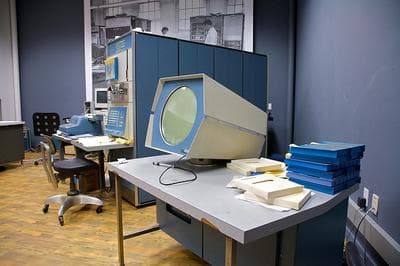Advertisement
Computer Pioneer And DEC Co-Founder Ken Olsen Dies
Resume
Computer pioneer Ken Olsen has died. The co-founder of Digital Equipment Corporation (DEC) passed away Sunday, while in hospice care in Indianapolis, Ind. Until recently, the 84-year-old had lived in Lincoln, Mass. At its peak, DEC, based in Maynard, was the second-largest computer company in the world.
Here's Olsen talking about the early days of computers, which he said started with one developed at the Massachusetts Institute of Technology:
It was a big one, the racks were 26 inches wide and 11 feet high. One of the things I learned from that was a computer should always be higher than a man. It never seems worth the money unless it's high. When we first started Digital, there were a few things we wanted to introduce to the world, and one of them was interactive computing.
WBUR's business and technology reporter Curt Nickisch joined Morning Edition to talk about the life and legacy of Ken Olsen.

Bob Oakes: Microsoft founder Bill Gates called Ken Olsen "one of the true pioneers of computing." Tell us about Olsen's role in the industry.
Curt Nickisch: Well, if you know names like Bill Gates and Steve Jobs but you haven't heard of Ken Olsen, you may be a bit young. But the fact is that we wouldn't have Microsoft and Apple and the personal computers we have today if it weren't for Ken Olsen and DEC.
When Ken started, computers were almost like glass houses, where people weren't allowed to fool around. And Digital made smaller, cheaper computers that let more people start doing things. DEC made computers interactive. And so it was DEC's customers that came up with new applications and new uses for computers and took computing to the next level.
How significant was Digital Equipment Corp. at its height. How influential was it?
Big company, more than 140,000 employees at one point. It was based out of an old wood mill in Maynard. DEC anchored a key Route 128 computer corridor with Wang and other companies.
But not just Route 128. If you drove out on Route 2 in the '80s, DEC was everywhere, in building after building after building. Thousands of employees, lifting the economy.
It was the billboard for the "Massachusetts Miracle" economic revival. And the other thing is, people loved working there. You know how you hear of Google today, where workers can bring their dogs and are supposed to work on projects they fancy? DEC was sort of that company. It had this decentralized management structure — very unorthodox. And I think Ken Olsen and his personality was a big part of that.
There’s a quotation that’s often attributed to Ken Olsen. In 1977, he’s speaking to a convention of the World Future Society. He's quoted as saying, “There is no reason for any individual to have a computer in his home.” That sounds like an odd thing for the co-founder and president of a big computer company to say.
It's often cited by people who want to make the point that DEC missed the boat when it came to the personal computer revolution. But the truth is DEC was moving in that direction and had gotten the rest of the industry to move there in the first place.
What really happened was DEC got on the wrong side of a propriety battle. They had their own software, and other people started using something else. It's kind of like after the Civil War, every railroad was using different gauge tracks. But it makes sense for there just to be one standard. And DEC was on the wrong side of a strategic decision.
And then it could never catch up!
Right. Eventually it was bought by Compaq in 1998, a sad end to a company that was dominant in Massachusetts for decades.
So, how is Olsen being remembered right now?
Ken Olsen is loved by all those computer folks who cut their teeth playing around on his machines. There's quite an outpouring online. And, of course, DEC has these really vibrant alumni groups in Redmond, Wash., and Silicon Valley and all the places that the DEC diaspora ended up.
People are talking about his "beautiful" machines. Bob Metcalfe, whom we profiled last month, tweeted that his "hero" had passed on: "Or JRST 4,777777 on his beautiful PDP-6/10."
Which means?
I take it that's a shutdown code for that computer.
More:
This program aired on February 8, 2011.
